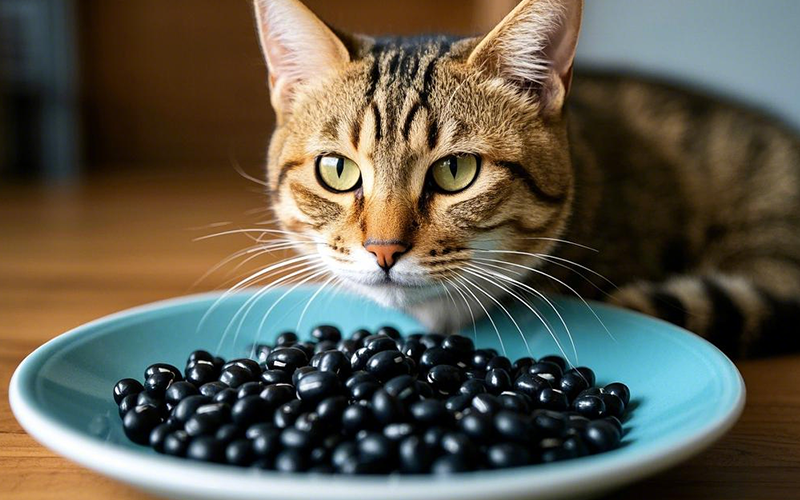Can Cats Eat Black Beans? What You Need to Know
- 15 Mar 2025 13:55
When it comes to sharing your food with your cat, you might wonder if beans, like black beans, are safe for them. While beans are a common food in many human diets, they’re not always the best choice for your feline friend. Let’s explore whether cats can eat black beans and the potential risks involved.

1. Can Cats Eat Black Beans?
Black beans are not toxic to cats, but they aren’t an ideal food for them either. Cats are obligate carnivores, which means they require a diet primarily composed of animal-based proteins. Beans, including black beans, are plant-based and don't provide the essential nutrients that cats need to thrive, such as taurine (an amino acid found in meat).
While small amounts of cooked black beans are generally safe for cats, they should only be offered occasionally and in moderation.
2. Why Cats Shouldn’t Eat Black Beans Regularly
Even though black beans aren’t toxic, they can still cause digestive issues in cats if fed too often. Here’s why:
Difficult to Digest: Beans contain fiber and complex carbohydrates that cats’ digestive systems aren’t built to process efficiently. Eating too many beans can lead to bloating, gas, and even diarrhea.
Potential for Gas: Beans, including black beans, are known for causing gas in humans, and the same can happen to cats. This can lead to discomfort and bloating, especially if your cat isn't used to eating plant-based foods.
Choking Hazard: If not prepared properly, beans can be a choking hazard for cats, especially if they’re large or not well-cooked.
Nutritional Imbalance: Black beans don’t provide the nutrients cats need for optimal health. They should not replace meat in your cat’s diet, as they lack essential vitamins, minerals, and proteins that come from animal sources.
3. What to Do If Your Cat Eats Black Beans
If your cat happens to eat black beans, there’s no need to panic. In small amounts, it’s unlikely to cause serious harm. However, keep an eye out for any signs of digestive distress, such as:
Vomiting
Diarrhea
Lethargy
Bloated or uncomfortable behavior
If your cat shows any of these signs, or if they ate a large quantity of beans, it’s a good idea to contact your veterinarian for advice.
4. Healthier Alternatives to Black Beans for Cats
If you’re looking to offer your cat a treat, there are much better options that are more suited to their dietary needs:
Cooked Chicken or Turkey: These protein-rich options are much more in line with what cats need to thrive.
Pumpkin: A small amount of cooked pumpkin can help with digestion and provide fiber without the bloating effect beans can cause.
Fish: Cats love fish like tuna or salmon (without bones or added seasoning), and these are excellent sources of protein and omega-3 fatty acids.
5. How PettureX Can Help You Make Safe Food Choices for Your Cat
If you're unsure about what foods are safe for your cat, PettureX can assist you. PettureX is a pet health AI assistant that offers 24/7 support for dietary and health concerns. With its image recognition tool, you can easily check if a particular food, like black beans, is safe for your cat and make informed decisions about your cat’s health and nutrition. 🐱📱
6. Conclusion: Can Cats Eat Black Beans?
While black beans are not toxic to cats, they aren’t the best choice for your feline friend. Cats should have a primarily meat-based diet to meet their nutritional needs. If you do decide to offer black beans, make sure they’re cooked and given in small amounts, as part of an occasional treat. Always monitor your cat for any digestive issues and stick to more suitable treats that support their health, such as lean meats or pumpkin.
Remember, when in doubt about your cat's diet, PettureX is always there to guide you! 🐾🌱
Related

The Burning Question: Can Cats Eat Jalapenos? A Comprehensive Safety Guide
- 21 Apr 2025
Cool Temptation: Can Cats Eat Ice Cream Safely? The Vet-Backed Truth
- 21 Apr 2025
Frankly Dangerous: Can Cats Eat Hot Dogs? Vet Explains the Serious Risks
- 16 Apr 2025
A Purrfect Protein? Can Cats Eat Ground Turkey Safely? (Vet-Reviewed Guide)
- 16 Apr 2025
Gritty Situation: Can Cats Eat Grits Safely? Vet Explains the Risks
- 16 Apr 2025
Gravy Danger Zone: Can Cats Eat Gravy Safely? (Vet-Reviewed Warning)
- 16 Apr 2025
Crunchy Query: Can Cats Eat Green Peppers? A Vet-Reviewed Safety Analysis
- 16 Apr 2025
Toxic Temptation: Can Cats Eat Grapefruit? Vet Explains the Dangers
- 16 Apr 2025
Emergency Meal or Major Mistake? Can Cats Eat Dog Food For A Couple Days? (Vet Guide)
- 16 Apr 2025
Dandelions & Felines: Can Cats Eat These Common Weeds Safely? Vet Explains
- 16 Apr 2025
